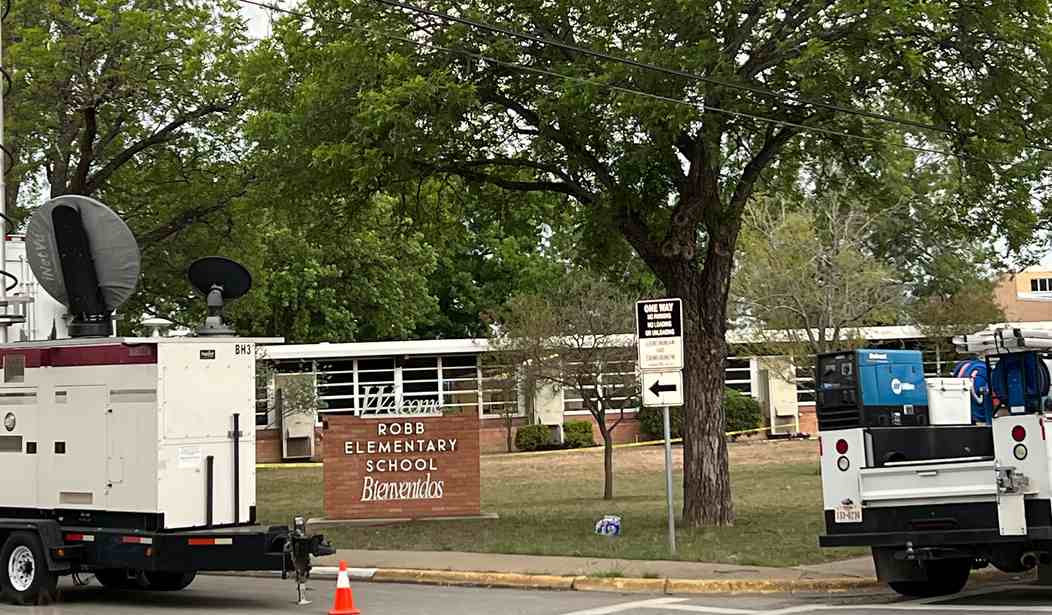There’s tons of buzz about this online this morning, and no wonder. It would be important if true, as it would raise the odds that a red-flag law in Texas might have prevented the shooter from buying any guns when he turned 18.
But is it true?
The fact that misinformation is flying around after a mass shooting is predictable and even understandable given how emotional people are. But it’s less understandable when it comes from the police.
Or from a U.S. congressman.
“The shooter was arrested years ago, four years ago, for having this plan for basically saying, you know, when I’m a senior in 2022, I am going to shoot up a school,” [Rep. Tony] Gonzales claimed on Fox News.
“Something fell between the cracks between then and now to allow this to happen. We need to shake out all the facts. We need to figure out what happened,” he continued.
“Where the holes and we need to make sure it doesn’t happen again. But if law enforcement, you know, identified him four years ago as a threat, we need to figure out why he wasn’t – you know, how he got removed from that.”
Until now it was believed the shooter had no criminal history. Gonzales’s bombshell claim would upend that. And, knowing that, one would think he would have triple-checked the information before sharing it with a national television audience that’s avidly following the news for updates on Uvalde.
He did not triple-check it, it appears:
Texas DPS & Texas Rangers tell me this is incorrect. There were two juveniles arrested on conspiracy charges for a shooting plot several years back, but the Uvalde shooter was not involved in that incident and was not arrested. @FoxNews https://t.co/TX5tvKTUt7
— Bill Melugin (@BillFOXLA) May 27, 2022
Gonzales himself is suddenly backing off:
It is now unclear if the shooter was one of the two kids detained.
If this was not the shooter, we need to find out who these kids are, where they are now, and if they were classmates of the shooter.
There is a clear need for mental health resources in our community.
— Rep. Tony Gonzales (@RepTonyGonzales) May 27, 2022
One of the cops who investigated the 2018 case told the Daily Beast that Gonzales “got his sh*t so wrong” and that he would have remembered if the Uvalde shooter had been involved.
Not great. Although it does raise an interesting hypothetical: If it turned out that the shooter was one of the kids arrested in 2018 but wasn’t convicted of anything, should that suffice under a red-flag law to deny him the right to buy a gun?
The due-process argument against it is obvious. If he wasn’t convicted of anything, by what right should he be denied his constitutional privilege to own a firearm? Beware the unintended consequences of red-flag laws, write Nikki Goeser and Thomas Massie:
Based only on a written complaint, which could come from a relative, friend, neighbor, or police officer, a judge decides whether to take away a person’s guns. There is no ability to challenge claims or to offer testimony from a mental health care expert. Gun control advocates argue that the person should not even know that the judge may be deciding to take his or her guns. When a hearing finally takes place up to a month later, if the person in question cannot afford an attorney, they will not be provided with one.
When faced with the costs for a hearing, which may be up to $10,000, few people find that fighting red flag laws to keep their guns makes sense. Few defendants obtain legal representation, but the courts still overturn a third of the initial orders. The actual error rate is undoubtedly much higher, because many of those wrongly prosecuted don’t have a lawyer.
State and federal laws already allow for the seizure of a person’s guns if that person is deemed unwell enough to be involuntarily committed, they note. And convicted felons are of course barred by federal law from owning a gun. But that gets us to the counterargument: The point of red-flag laws is to disarm someone who seems “off” and potentially dangerous even to their friends and family but maybe not so much so that they’d meet the threshold to be institutionalized against their will. If an 18-year-old goes around introducing himself as a school shooter, we might dismiss it as dark humor or general teenaged weirdness. But if their own parent or best friend is telling cops that something’s amiss and they fear a ticking time bomb, do we shrug that off and politely wish them good luck with their state’s involuntary commitment law?
We should want the legal standard for institutionalization, in which a person is deprived of their basic liberty to move about freely, to be exceptionally high. Should it be just as high for the temporary deprivation of one particular right?
This is an urgent question since, realistically, red-flag laws are the only potential tool in the legal toolbox that stand a chance of meaningfully reducing mass shootings. Universal background checks aren’t going to do it. Raising the legal age to purchase guns to 21 would help, but one assumes that most people willing to slaughter children when they’re 18 if they can get hold of a gun probably aren’t going to outgrow that fantasy in three years. Either we lower the standard for seizing guns from people whose own intimates deem them a threat or we’re doomed to do nothing.
I’ll leave you with this sad sack, whose solution to kids being terrorized apparently involves terrorizing them more.
Eric Swalwell: "Every parent in America right now is lying to their kids. If you’re telling your kid they’re going to safe at their school and everything is going to be okay, it’s a lie." pic.twitter.com/xj0s7r5N2G
— Washington Free Beacon (@FreeBeacon) May 25, 2022








Join the conversation as a VIP Member